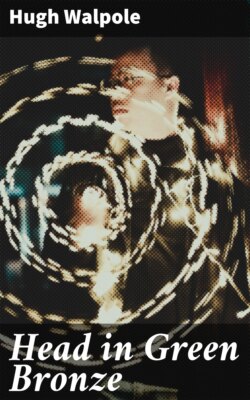Читать книгу Head in Green Bronze - Hugh Walpole - Страница 4
На сайте Литреса книга снята с продажи.
HEAD IN GREEN BRONZE
ОглавлениеTable of Contents
The Lord God Almighty was busy that time examining the artists. This was a tiresome and monotonous job, for He had been doing it for thousands and thousands of centuries and, with one or two exceptions a century, artists are always the same.
About Him stretched into everlasting space fields and fields of light, rather as on an early summer evening, when the harvesters have drawn away home and the sun-drenched soil is left to its own peace.
But every artist as he appeared for his examination brought with him his own personal memory and consciousness, his individual litter....
It was the authors whom just now God Almighty was examining. The examinations were very brief.
Against the vast eternity of light—light upon light upon light and of a stainless purity—the impedimenta of each separate little soul seemed incredibly mean and paltry. Now, for example, there was William Newcombe with his country cottage, old oak beams, settle by the fire, flagged garden path, refrigerator and most modern bathroom. Also his twenty-three travel books and his blank-verse drama called Armageddon.
‘They all sold very well, I hear,’ said God Almighty.
‘Well,’ William answered modestly, ‘they did. Except Armageddon, which didn’t sell at all.’
‘Why did you write that one?’ asked God Almighty.
‘Because I wanted to,’ said William, blinking his old eyes a little at the unaccustomed light.
‘Good,’ said God Almighty. ‘Because of that one book you may have with you, while at work, any one of your earthly goods and chattels you prefer.’
‘My dog Caesar,’ William said promptly. All his impedimenta, oak beams, garden path, bathroom, all the travel books disappeared, and only a charming fox-terrier with engaging whiskers, frisking in the light, remained. William and Caesar, in the charge of an Archangel, passed into light.
A flock of angels cut the brilliant air like a wave breaking through mist.
‘Next one,’ said God Almighty.
This was Peter Bentham, whose consciousness provided him with four very thin books of poetry, a life of Rimbaud, a small painting by Dali, and a cough mixture in a dirty blue bottle.
God Almighty looked at him. ‘How have you allowed your body to get into such a miserable state?’
‘I never was very strong,’ Peter answered with that rather shrill staccato little cry that had before now thrown so much terrible scorn on prosperity and success.
‘I’m afraid,’ said God Almighty gently (for there was something very touching about Peter), ‘that you have prevented yourself from enjoying too many amusing and vivifying things.’
‘That,’ said Peter firmly (he was not going to be put down by a God Who, all his life, he had asserted did not exist), ‘is because my taste has always been perfect. I have never been able to endure any kind of athletics, popular novels and novelists, optimistic essays and sentimental plays, patriotism, or anyone, male or female, in rude health.’
‘What have you enjoyed?’ God Almighty asked.
‘My own poetry,’ Peter answered, ‘the paintings of Dali, Miró and Léger, the music of Tschenakivitzky, free love in Russia and a cocktail called “Flowers of Parnassus.” ’
‘I like your honesty,’ God Almighty said, ‘but you are a little too serious, especially about yourself. However, what you really need is fattening up. Without your earthly clothes’ (for now all Peter’s worldly impedimenta had vanished) ‘you are frankly a miserable object—nor have you washed as frequently as you should. However, we shall soon change all that. I shall hand you over to Henry Fielding for an aeon or two.’
And then came Margaret Cunningham, a tall, fat, red-faced woman whose teeth because they had not been kept back in childhood now protruded over a receding chin. Without her clothes she was shapeless, helpless, innocent. Her impedimenta were an untidy two-roomed flat, a tortoiseshell cat, some London chimneys, her working tools and some twenty-four misshapen clay heads with long necks leaning to right or left.
‘Well, Margaret,’ God Almighty said kindly, ‘I’m afraid you haven’t made much of a living out of this work of yours.’
‘Well, no, I haven’t,’ Margaret said frankly in her Woman’s-Club how-are-you-all-girls voice. ‘Of course there was the teaching twice a week.’ She felt the light on her nakedness with so keen a pleasure that her brown-grey eyes shone with delight. ‘It’s like the Riviera, which I’ve never been able to afford,’ she said.
‘But this,’ said God Almighty, ‘has been always your secret longing’—and there, solid against the light, was the curving road, the signpost ‘To Watendlath,’ the newspaper placard ‘Mussolini attacks Britain’ and the stream, the shelving green hill, the mouse-shaped clouds watching a cat-faced moon.
‘Yes,’ Margaret murmured. ‘That and the head in green bronze.’
‘Head of whom?’ God Almighty asked.
‘Of no one in particular. Simply a grand head of some hero—in dark green bronze. I’ve imagined myself for years and years creating such a thing. I could, I believe, if I’d gone on. I was really improving. But then I caught cold and pneumonia followed—and here I am!’
‘There’s plenty of time,’ God Almighty said. He looked at Margaret kindly. ‘Here’s where you’ve always wanted to be. You’re a true artist although not as yet a very good one. Donatello shall give you a lesson or two....’
Margaret was on her bare knees looking into the stream behind Rosthwaite. Beside her was a little pile of clay.
‘God Almighty thinks I can help you,’ a voice said.
She looked up and saw Donatello, naked and glorious. He knelt down beside her, taking the clay in his hands.
‘Now let us see,’ he said. ‘Head of a Hero in green bronze....’
